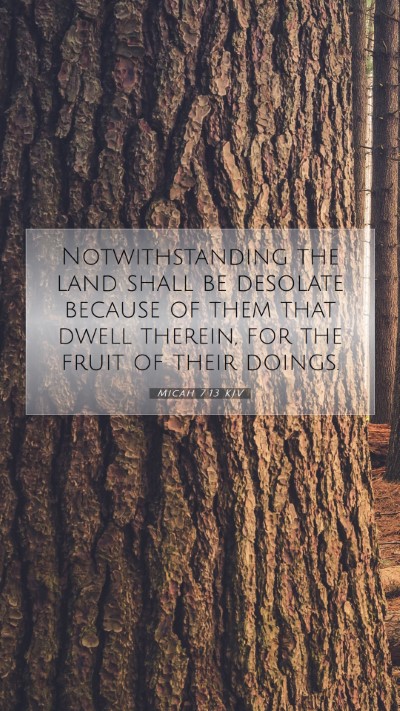Old Testament
Genesis Exodus Leviticus Numbers Deuteronomy Joshua Judges Ruth 1 Samuel 2 Samuel 1 Kings 2 Kings 1 Chronicles 2 Chronicles Ezra Nehemiah Esther Job Psalms Proverbs Ecclesiastes Song of Solomon Isaiah Jeremiah Lamentations Ezekiel Daniel Hosea Joel Amos Obadiah Jonah Micah Nahum Habakkuk Zephaniah Haggai Zechariah MalachiMicah 7:13 Meaning
What is the meaning of Micah 7:13?
Notwithstanding the land shall be desolate because of them that dwell therein, for the fruit of their doings.
Micah 7:13 Bible Verse Meaning
Understanding Micah 7:13 - Bible Verse Interpretation
Micah 7:13 states: "Notwithstanding the land shall be desolate because of them that dwell therein, for the fruit of their doings." This verse encapsulates a profound truth about the consequences of sin and the inevitability of divine judgment. Below, we offer a combined interpretation from various public domain commentaries, shedding light on its meaning and significance for contemporary readers.
Verse Context and Summary
In the context of Micah, the prophet speaks during a time of moral decay and impending judgment on Israel. This verse is part of a larger discussion regarding the theological and practical implications of sin, the accountability of the people, and the resulting desolation of the land.
Commentary Insights
-
Matthew Henry Commentary:
Henry emphasizes the certainty of desolation resulting from the people's unfaithfulness. He notes that the earth itself reacts to human sin, illustrating that the land's condition reflects the spiritual state of its inhabitants. The emphasis is on the direct correlation between moral failings and environmental consequences.
-
Albert Barnes’ Notes on the Bible:
Barnes provides a historical context, indicating that this disarray is not merely a natural disaster but a consequence of the people's sinfulness. He links the phrase "the fruit of their doings" to the universal law of reaping what one sows, highlighting the theological principle that actions have spiritual and physical repercussions.
-
Adam Clarke's Commentary:
Clarke explores the imagery of desolation as a divine warning. He points out that the land's desolation serves as a stark reminder of the consequences of abandonment of God's ways. Clarke juxtaposes the temporary fruits of sin against the lasting emptiness of judgment, urging readers to consider their own actions in light of God's standards.
Theological Considerations
This verse raises vital theological questions regarding the nature of God’s justice and mercy. It serves as an admonition that while grace is abundant, there exists a point of accountability. The implications of repentance are profound, highlighting the necessity of turning back to God to avoid desolation.
Application to Daily Life
For modern readers, Micah 7:13 challenges individuals and communities to reflect on their actions and the resultant societal conditions. It encourages an examination of personal and communal sin and the importance of cultivation of a righteous path. In the lens of applying Bible verses to daily life, believers are called to choose actions that honor God to foster spiritual and communal flourishing.
Related Bible Verses
- Galatians 6:7: "Be not deceived; God is not mocked: for whatsoever a man soweth, that shall he also reap."
- Isaiah 5:6: "And I will lay it waste: it shall not be pruned, nor digged; but there shall come up briers and thorns: I will also command the clouds that they rain no rain upon it."
- Jeremiah 4:27: "For thus hath the Lord said, The whole land shall be desolate; yet will I not make a full end."
- 2 Chronicles 36:21: "To fulfil the word of the Lord by the mouth of Jeremiah, until the land had enjoyed her sabbaths: for as long as she lay desolate she kept sabbath, to fulfil threescore and ten years."
- Hosea 4:3: "Therefore shall the land mourn, and everyone that dwelleth therein shall languish."
Conclusion
In summary, Micah 7:13 serves as a poignant reminder of the destructive consequences that stem from disobedience to God. Through the insights from various commentaries, it becomes clear that understanding this verse is crucial for grasping the broader narrative of sin and redemption within Scripture. By studying this verse and others like it, believers can deepen their Bible verse understanding and gain valuable Bible study insights to apply to their lives.


